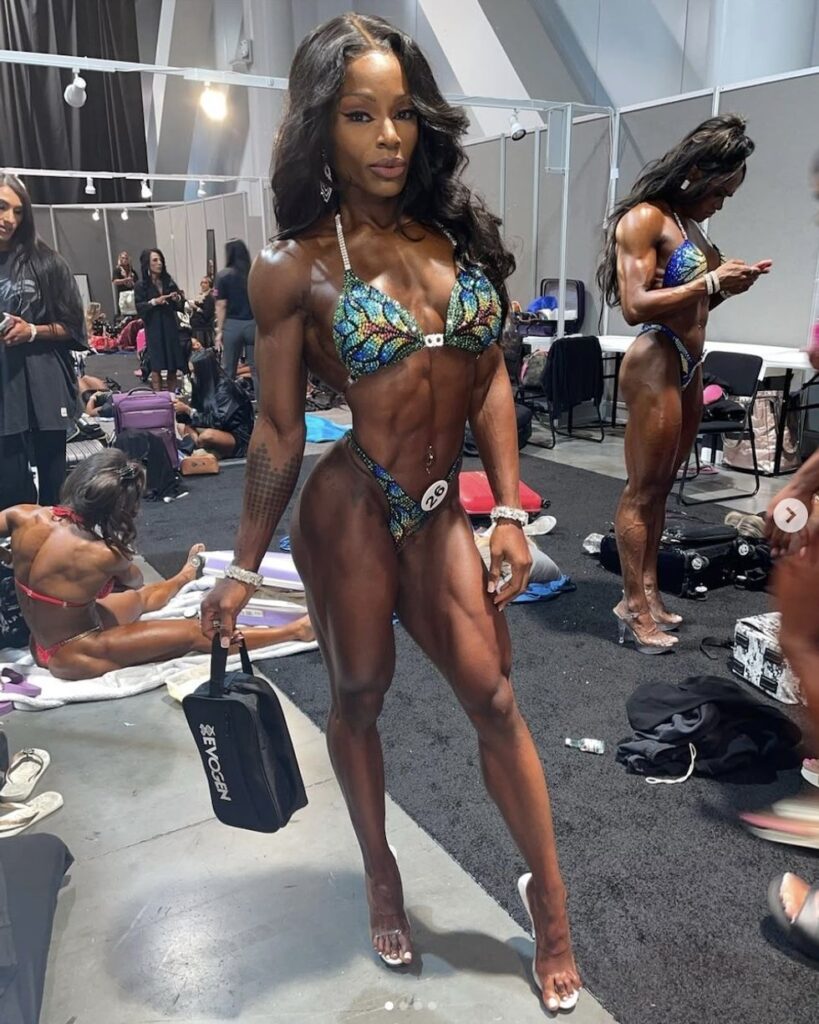Cydney Gillon is posing and appreciating her body 8 weeks post-show – in her two-piece workout gear. In a new social media post the IFBB pro takes a moment to show off her fit figure and celebrate it with a self-love post. “If you don’t learn anything else from me, learn the importance of a reverse diet, year-round consistency and loving your body at EVERY stage,” she wrote. “So glad I mastered self-discipline before I retired. I really started locking in my ‘retirement mindset’ two years ago so that I was prepared to make the shift.” How does she approach diet, fitness, and self-care? Here is everything you need to know about her lifestyle habits.
6 Small Meals a Day
Cydney Gillon/Instagram
Cydney detailed her diet to Kaged explaining that she sticks to 6 small meals per day. “Most of these meals will be fairly small to keep you from exceeding your recommended calories each day. A couple of the benefits of consuming multiple meals a day is that you’ll have a constant supply of amino acids to protect you muscle mass, and you’ll have fuel in your system to help prevent you from cheating,” she said. She aims for 2100 calories per day. “You know that calories count. You aren’t going to get rid of body fat if you’re consuming too many calories each day. The question for you is: How many calories should you take in each day? My suggestion may shock you a bit. I recommend that you consume 15 calories for the body weight you expect to achieve at the end of this 8-week program. And you shouldn’t expect to drop more than about 10 pounds — with a few exceptions — because you’ll also be adding muscle,” she says.
Protein
Cydney Gillon/Instagram
“When your goal is to cut body fat while retaining or even building muscle tissue, it’s crucial that you consume plenty of protein every day. And it’s also important that you get in protein at regular intervals throughout the day. That’s because you need those free-floating amino acids in your system to make sure that your body isn’t breaking down muscle tissue to fuel your workouts and supply energy for daily activities,” she continues. “My recommendation is that you get in at least 40 percent of your calories from protein. If you’re that person who is consuming 2100 calories a day on this program, that means you need to consume about 210 grams of protein each day.” Protein sources she recommends include egg whites, eggs, chicken, ground turkey, Micropure Whey Protein Isolate and Kasein. “You can also consume other forms of protein such as white fish, fatty fish, seafood, and lean beef. Vegetarian forms will work as well if you don’t eat meat,” she says.
Carbohydrates
Cydney Gillon/Instagram
In total, about 40 percent of your daily intake of calories should come from carbohydrates, according to Cydney. “For women who are consuming 2100 calories a day that means you should get in about 210g of carbs each day,” she says, recommending slow-digesting forms of carbohydrates. “These foods stay with you longer, and they help prevent you from feeling hungry. In addition, they help control the release of insulin, a benefit while you’re dieting. Good examples of slow-digesting carbs that I like are brown rice, oatmeal, and sweet potatoes and yams. These foods also help you replace muscle glycogen, which you burn when you’re training with intensity,” she says. “You can also consume plenty of vegetables and fruits. For vegetables, I like low-calorie green veggies that are high in fiber and nutrients. Examples include zucchini, broccoli, asparagus, Brussels sprouts and spinach. In addition you can get in raw crunchy vegetables such as celery and all forms of leafy greens. With fruits, you should emphasize those that are low in calories and high in fiber. Berries are among the best choices. In addition, you can consume beans and lentils that are high in dietary fiber. Good examples include pinto, black, chickpeas/garbanzo beans and green peas. It’s important to get in plenty to fiber because it provides satiety, and it helps your digestive system working regularly. Not everyone handles a high-protein diet all that well when they begin, and bumping up fiber can help.”
Dietary Fats
Cydney Gillon/Instagram
Dietary fats are also important. “In fact they should make up about 20 percent of your daily intake. Dietary fats are not the enemy when you’re trying to reduce body fat; they can be very beneficial so long as you don’t over consume them,” she says. “While every gram of fat contains 9 calories per gram (as compared to about 4 calories per gram for carbs and protein), one of the benefits of consuming fats is that they digest slowly and provide satiety, which is crucial in helping you stay on your nutrition program while shedding body fat.” She recommends consuming equal portions of “healthy” and “saturated” fats. “Healthy fats such as Omega 3s and 6s protect your heart and spur growth. While most people in the Western world tend to get in plenty of Omega 6s, they often have a deficit in Omega 3s. Good sources of Omega 3s include fatty fish such as salmon and sardines. These may not be your favorite foods, but you can also supplement Omega 3s if you aren’t getting in enough of them from foods,” she says.
Hydration
Cydney Gillon/Instagram
“Don’t forget that you need to take in plenty of water every day. That’s especially true when you’re training with intensity and cutting calories to reduce body fat. I like to drink water when I get out of bed first thing in the morning,” she says. “Remember that all low- or no-calorie beverages such as tea and coffee also provide fluids, so you don’t need to cut these while you’re on my 8-week Fat-loss Figure Trainer. My recommendation is that you get in about 1 gallon of water each day.”





